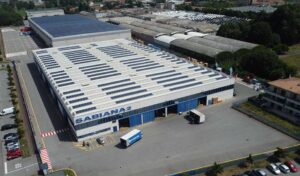Cooling without electricity
5th September 2017
USA: Scientists at Stanford University claim to have developed radiative cooling panels that can reduce the temperature of flowing water to 5ºC below ambient.
The development builds on radiative cooling research, initiated in 2013, a roof as a testbed for a high-tech mirror-like optical surface that could reduce the energy requirement of air conditioning and refrigeration. The research team is now said to have shown that a system involving these surfaces can cool flowing water to a temperature below that of the surrounding air. The entire cooling process is done without electricity.
“This research builds on our previous work with radiative sky cooling but takes it to the next level. It provides for the first time a high-fidelity technology demonstration of how you can use radiative sky cooling to passively cool a fluid and, in doing so, connect it with cooling systems to save electricity,” said Aaswath Raman, who is co-lead author of a paper detailing this research, published in Nature Energy.
Professor of electrical engineering Shanhui Fan and former research associates Aaswath Raman and Eli Goldstein have founded the company SkyCool Systems, which is working on further testing and commercialising this technology.
While on a hot sunny day sunlight will warm more than radiative sky cooling will cool, the SkyCool system uses a multilayer optical film that reflects about 97% of the sunlight while simultaneously being able to emit the surface’s thermal energy through the atmosphere. Without heat from sunlight, the team maintains that the radiative sky cooling effect can enable cooling below the air temperature even on a sunny day.
“With this technology, we’re no longer limited by what the air temperature is, we’re limited by something much colder – the sky and space,” said Eli Goldstein, co-lead author of the paper.
The experiments published in 2014 were performed using small wafers of a multilayer optical surface, about 8in in diameter, and only showed how the surface itself cooled. The next step was to scale up the technology and see how it works as part of a larger cooling system.
For their latest paper, the researchers created a system where panels covered in the specialised optical surfaces sat atop pipes of running water and tested it on the roof of the Stanford University’s Packard Building in September 2015. These panels were slightly more than 2ft in length on each side and the researchers ran as many as four at a time. With the water moving at a relatively fast rate, they found the panels were able to consistently reduce the temperature of the water 3-5ºC below ambient air temperature over a period of three days.
The researchers also applied data from this experiment to a simulation where their panels covered the roof of a two-storey commercial office building in Las Vegas – a hot, dry location where their panels would work best. They calculated how much electricity they could save if, in place of a conventional air-cooled chiller, they used vapour-compression system with a condenser cooled by their panels. They found that, in the summer months, the panel-cooled system would save 14.3 MWh of electricity, a 21% reduction in the electricity used to cool the building. Over the entire period, the daily electricity savings fluctuated from 18-50%.
SkyCool Systems is now measuring the energy saved when panels are integrated with traditional air conditioning and refrigeration systems at a test facility. The researchers are focused on making their panels integrate easily with standard air conditioning and refrigeration systems and are said to be particularly excited at the prospect of applying their technology to the serious task of cooling data centres.
Fan has also carried out research on various other aspects of radiative cooling technology. He and Raman have applied the concept of radiative sky cooling to the creation of an efficiency-boosting coating for solar cells. With Yi Cui, a professor of materials science and engineering at Stanford and of photon science at SLAC National Accelerator Laboratory, Fan developed a cooling fabric.
“It’s very intriguing to think about the universe as such an immense resource for cooling and all the many interesting, creative ideas that one could come up with to take advantage of this,” he said.
Related stories:
New material could reduce air conditioning load – 27 November 2014
USA: Engineers at Stanford University, California, claim to have invented a new mirror-like material which could reduce the air conditioning load of buildings. Read more…







